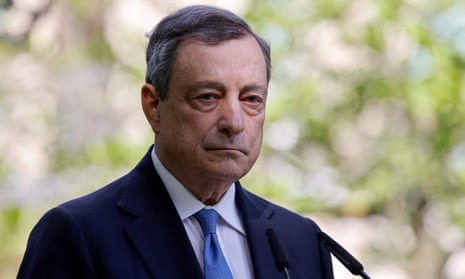Mario Draghi has confirmed his resignation as Italy’s prime minister after an attempt to salvage his broad coalition failed when three key parties snubbed a confidence vote, paving the way for snap elections that could take place as early as late September.
Backed by a groundswell of public support, the former European Central Bank chief had attempted to continue his administration on condition that his alliance “rebuild a pact of trust” that would enable it to work together to overcome huge challenges over the coming months.
Draghi formally handed his resignation to President Sergio Mattarella on Thursday morning and it was accepted.
However, the populist Five Star Movement (M5S), Matteo Salvini’s far-right League and Silvio Berlusconi’s Forza Italia did not participate in a confidence vote in the senate on Thursday night that essentially called for parties to approve a spirit of cooperation.
The political crisis was triggered last week after M5S boycotted a vote on a €26bn (£22bn package) designed to help Italians tackle inflation and energy costs, arguing it was insufficient. The party was also unhappy that the package contained a provision to build a huge waste incinerator plant in Rome.
The League and Forza Italia had called for a new Draghi-led government, but without M5S, while demanding a cabinet reshuffle. M5S was annoyed that Draghi had not embraced the policy priorities presented to him in its “nine-point” plan, including a basic income and green homes bonus scheme.
Draghi’s resignation comes despite calls for him to remain in post, including from world leaders who see him as fundamental to not only ensuring stability in Italy but as a partner in facing the challenges of Russia’s war in Ukraine.
He had urged unity in order to face challenges such as the Ukraine war, the energy crisis, social inequality and the enactment of reforms needed to obtain the next tranche of the €200bn Italy is due to receive from the EU’s post-pandemic recovery fund. He also rebuked his coalition partners for infighting and point-scoring over recent months.
His departure will most likely lead to early elections that could take place on 25 September or 2 October. It is possible that Mattarella will ask Draghi to stay on as caretaker prime minister until a new government is formed after the elections.
A survey of recent polls found that if early elections were held, a coalition led by the far-right Brothers of Italy and including the League and Forza Italia could win a majority.
